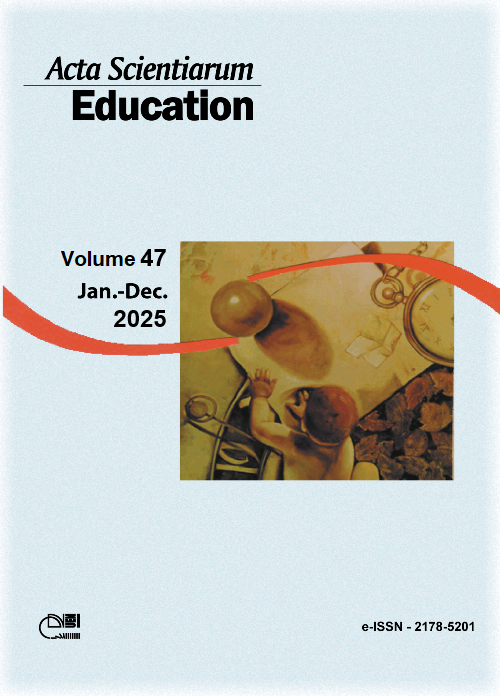Rethinking initial teacher training in natural sciences: a chilean intercultural perspective in La Araucanía
Abstract
The article describes the initial teacher training in the subject of natural sciences from an intercultural perspective of the didactics of this subject. In this sense, the persistence and colonial roots in the formative itineraries of the initial teacher training in Natural Sciences, which perpetuates a western Eurocentric view in the teaching and learning processes of Natural Sciences and its didactics, in the socio-historical context of La Araucanía, Chile, is problematized. The methodology is qualitative of documentary-descriptive type. The main results show the urgency of a transformation of the initial teacher training in the area of Natural Sciences based on an intercultural perspective and epistemological pluralism. This, in order to promote meaningful and contextualized educational experiences that favor a dialogue of knowledge between the disciplinary contents of the school curriculum and indigenous educational knowledge. Thus, the implementation of a culturally, socially and territorially relevant education is made possible in diverse educational scenarios, such as in the indigenous context. We conclude on the need to incorporate an intercultural educational approach in the initial teacher training processes, which allows future teachers to acquire the didactic, pedagogical and curricular domain to perform in contexts of social and cultural diversity.
Downloads
References
Arias-Ortega, K., & Previl, C. (2023). Essential Mapuche knowledge for an effective intercultural school education: perspectives of traditional educators. Journal of Multilingual and Multicultural Development, 46(53), 1-14. https://doi.org/10.1080/01434632.2023.2219235
Arias-Ortega, K., Villarroel, V., & Quintriqueo, S. (2023b). Voices of university teachers on intercultural professional training Needs in La Araucanía, Chile. Revista Electrónica Educare, 27(2), 295-312. https://doi.org/10.15359/ree.27-2.16296
Arias-Ortega, K., Villarroel, V., & Sanhueza-Estay, C. (2023a). Dispossession of Indigenous Knowledge in the Chilean Education System: Mapuche Experiences in Chile. Journal of Latinos and Education, 23(1), 1-12. https://doi.org/10.1080/15348431.2023.2276782
Blanco-Figueredo, L., & Arias-Ortega, K. (2023). Competency-based training versus teacher training in professional performance: a debate in educational sciences programs. Journal of Ethnic and Cultural Studies, 10(3), 190-212. https://doi.org/10.29333/ejecs/1406
Bardin, L. (1996). Análisis de contenido. Akal Ediciones.
Bascopé, M., & Caniguan, N. (2016). Propuesta pedagógica para la incorporación de conocimientos tradicionales de Ciencias Naturales en primaria. Revista Electrónica de Investigación Educativa, 18(3),161-175.
Callahan, D. (1972). Living with the new biology. The Center Magazine, 5(4), 4-12.
Carrillo, C. (2002). Ciencia y etnociencias. Revista Ciencias, 66(1), 110-117.
Castillo, A., Suárez, J., & Mosquera, J. (2017). Naturaleza y sociedad: relaciones y tendencias desde un enfoque eurocéntrico. Revista Luna Azul, 44(1), 348-371. https://doi.org/10.17151/luaz.2017.44.21
Carter, L. (2017). Pensando diferente respecto a la diversidad cultural: utilización de la teoría postcolonial para (re) leer la enseñanza de las ciencias. Science of Education, 88(6), 819-836.
Ferrada, D., Turra, O., & Villena, A. (2013). Currículum transformador de formación inicial para profesores en contextos de vulnerabilidad social. Cadernos de Pesquisa, 43(149), 642-661. https://doi.org/10.1590/S0100-15742013000200013
Grebe, M. (2000). Relaciones hombre/naturaleza en la cultura mapuche. Los Ngen: sus implicancias y proyecciones socioculturales [Ponencia]. Actas del 9ª Jornadas de Alternativas Religiosas en América Latina, Buenos Aires, AR.
Chile. (2012). Estándares orientadores para carreras de pedagogía. Ministerio de Educación de Chile.
Creswell, J. (2014). A concise introduction to mixed methods research. SAGE publications.
Lobytsyna, M., Moate, J., & Moloney, R. (2020). Being a good neighbour: developing intercultural understanding through critical dialogue between an Australian and Finnish crosscase study. Language and Intercultural Communication, 20(6), 621-636. https://doi.org/10.1080/14708477.2020.1810258
Musaio, M. (2021). Rethinking the fundamentals and practices of intercultural education in an era of insecurity. Sociedad Española de Pedagogía, 73(1), 97-110. https://doi.org/10.13042/Bordon.2021.86114
Pacheco, C., & Osses, S. (2015). Saberes mapuche en la relación del hombre con la naturaleza: aportes para sustentar una Educación Ambiental desde la interculturalidad [Presentación del trabajo]. Actas del 8º Encuentro Nacional de Experiencias en Enseñanza de la Biología y la Educación Ambiental, Bogotá, CO.
Pérez, M., & Argueta, A. (2015). Jóvenes indígenas como promotores culturales dos experiencias mexicanas (1951 – 1992). En M. L. Pérez Ruiz, V. Ruiz Lagier, & S.l Velasco Cruz (Coords.), Interculturalidad(es). Jóvenes indígenas: educación y migración (pp. 27-75). Editorial Universidad Pedagógica Nacional.
Quilaqueo Rapimán, D., Torres Cuevas, H., & Álvarez Santullano, P. (2022). Educación familiar mapuche: epistemes para el diálogo con la educación escolar. Pensamiento educativo, 59(1), 1-12.
Quintriqueo, S., Quilaqueo, D., Gutiérrez, M., & Peña-Cortés, F. (2015). Enseñanza de historia, geografía y ciencias sociales: hacia una perspectiva intercultural. Ediciones Universidad Católica de Temuco.
Rodríguez-Izquierdo, R., & González-Faraco, J. (2021). La educación culturalmente relevante: un modelo pedagógico para los estudiantes de origen cultural diverso. Concepto, posibilidades y limitaciones. Teoría de la Educación. Revista Interuniversitaria, 33(1), 153-172. https://doi.org/10.14201/teri.22990
Vergara, T., & Albanese, V. (2017). Repensar la enseñanza de las ciencias en la Educación Intercultural Bilingüe: ¿un nuevo modelo de enseñanza? [Presentación del trabajo]. Actas del 10º Congreso Internacional sobre Investigación en Didáctica de las Ciencias, Sevilla, ES.
Villarroel, V., Arias-Ortega, K., & Quintriqueo, S. (2022). Didactica intercultural para las ciencias naturales. Investigações em Ensino de Ciências, 27(2), 243-256. https://doi.org/10.22600/1518-8795.ienci2022v27n2p243

This work is licensed under a Creative Commons Attribution 4.0 International License.
DECLARATION OF ORIGINALITY AND COPYRIGHTS
I declare that this article is original and has not been submitted for publication in any other national or international journal, either in part or in its entirety.
The copyright belongs exclusively to the authors. The licensing rights used by the journal are the Creative Commons Attribution 4.0 (CC BY 4.0) license: sharing (copying and distributing the material in any medium or format) and adaptation (remixing, transforming, and building upon the material thus licensed for any purpose, including commercial purposes) are permitted.
It is recommended that you read this link for more information on the subject: providing credits and references correctly, among other crucial details for the proper use of the licensed material.















































